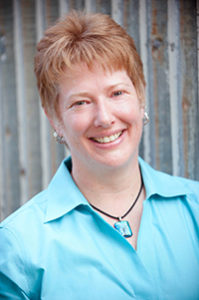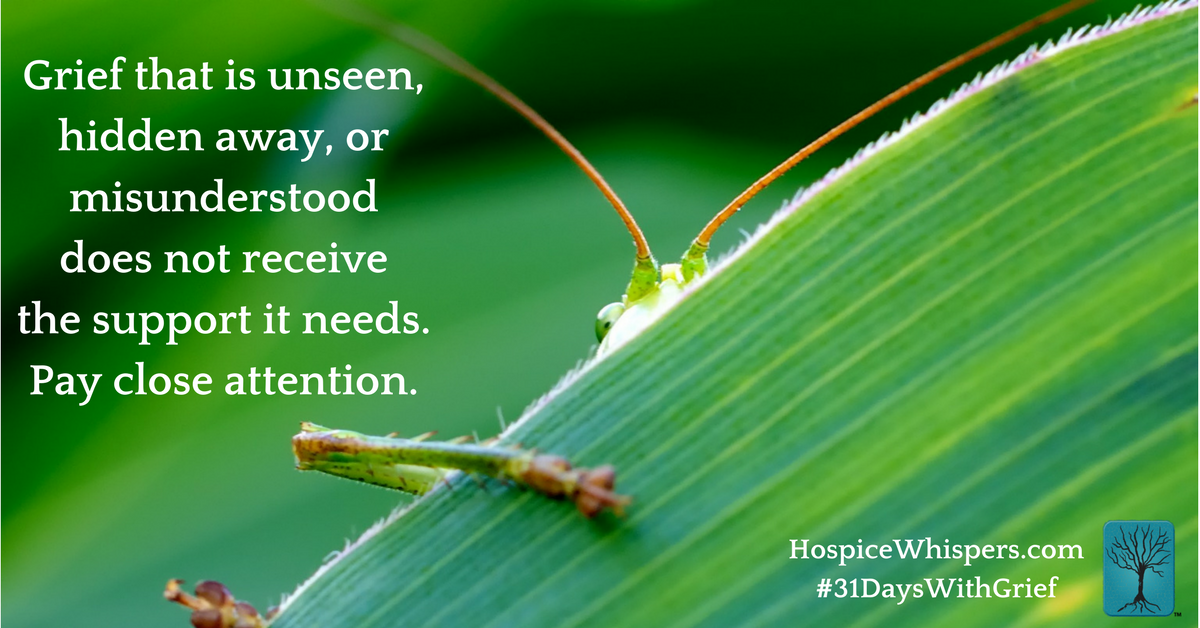31 Days of Walking with Grief: Others’ and Our Own
Day 18—The Isolation of Disenfranchised Grief
This is a month-long series to support persons grieving and those who love them. It includes content from “Sharing Our Stories: A Hospice Whispers Grief Support Workbook” available through Amazon and wherever books are sold.
In the Sharing Our Stories grief workbook, I had this to say about disenfranchised grief:
“Disenfranchised grief is that which is not known, acknowledged, or understood by society. When this occurs others do not know to offer support (i.e., when a secret relationship ends) or they do not offer adequate support out of a lack of understanding (i.e., after a miscarriage, death of a pet, or any time others begin to feel that someone should be over their grief within a certain period of time).
When a deceased loved one was challenging or even abusive to live with, most others around us will not know the private story. As a result, those who have been victimized may be reminded painfully of the original trauma, and the secrets that surrounded it, as others praise the one who perpetrated the abuse as a wonderful person, not knowing the damage he or she also caused.
Others may not realize the extra triggers and confusion that can occur when a person with whom we had a challenging relationship dies. As a result, they may not offer us adequate support. What, if any, has been your experience of disenfranchised grief? What healing might you still be in need of that you could receive from others about this now?”
(Pp 58-59 of “Sharing Our Stories: A Hospice Whispers Grief Support Workbook” ©2016)
This was written as part of the reflection on the Hospice Whispers story, “Your Mom Is So Sweet” ©2014. It details one well-meaning volunteer who gushed about how sweet a patient was to the patient’s daughter, who had lived her whole life with her mother’s on-going abuse.
I don’t know your story (that’s what the sweet but inexperienced volunteer learned from this situation), but whatever it is it’s important to notice if any of your grief is in any way being sent, by you or others, underground. Is there any way in which your grief can’t be adequately processed through because it’s not sufficiently recognized, supported, or given safe space to be heard?
When I was a teenager, a close family member suffered from mental illness and saw enemies everywhere she turned. I was not allowed to openly demonstrate grief about the deaths of a friend and later a family member because she held so much against them that my grieving appeared to her like a betrayal and she squelched my tears harshly.
Others did not know this was happening. So I grieved the deaths largely in private and grieved the emotional abuse of the whole twisted circumstance completely in silence for many years.
It wasn’t until I began working with those who grieve (funny how we find what we need…) that I realized my need to go back and mourn these two deaths. Ugh! And yet, the relief and freedom I found on the other side of finally grieving all of this were well worth the price of admission.
Trust me. Find places to not be alone anymore with disenfranchised grief. It may be hard, but I promise, it’s worth it.
Peace,
Carla
 Rev. Carla Cheatham, MA, MDiv, PhD, TRT has served hospices as a chaplain and bereavement coordinator. She’s the Section Leader for the Spiritual Caregivers Section of the National Hospice and Palliative Care Organization and an adjunct professor at the Seminary of the Southwest. Through her Carla Cheatham Consulting Group, Carla provides training and consulting for professional caregivers nationwide. She is the author of Hospice Whispers: Stories of Life and its companion volume, Sharing Our Stories: A Hospice Whispers Grief Support Workbook. Her next book, On Showing Up with Suffering: Others’ and Our Own, is set to publish in 2017.
Rev. Carla Cheatham, MA, MDiv, PhD, TRT has served hospices as a chaplain and bereavement coordinator. She’s the Section Leader for the Spiritual Caregivers Section of the National Hospice and Palliative Care Organization and an adjunct professor at the Seminary of the Southwest. Through her Carla Cheatham Consulting Group, Carla provides training and consulting for professional caregivers nationwide. She is the author of Hospice Whispers: Stories of Life and its companion volume, Sharing Our Stories: A Hospice Whispers Grief Support Workbook. Her next book, On Showing Up with Suffering: Others’ and Our Own, is set to publish in 2017.



Leave a Reply